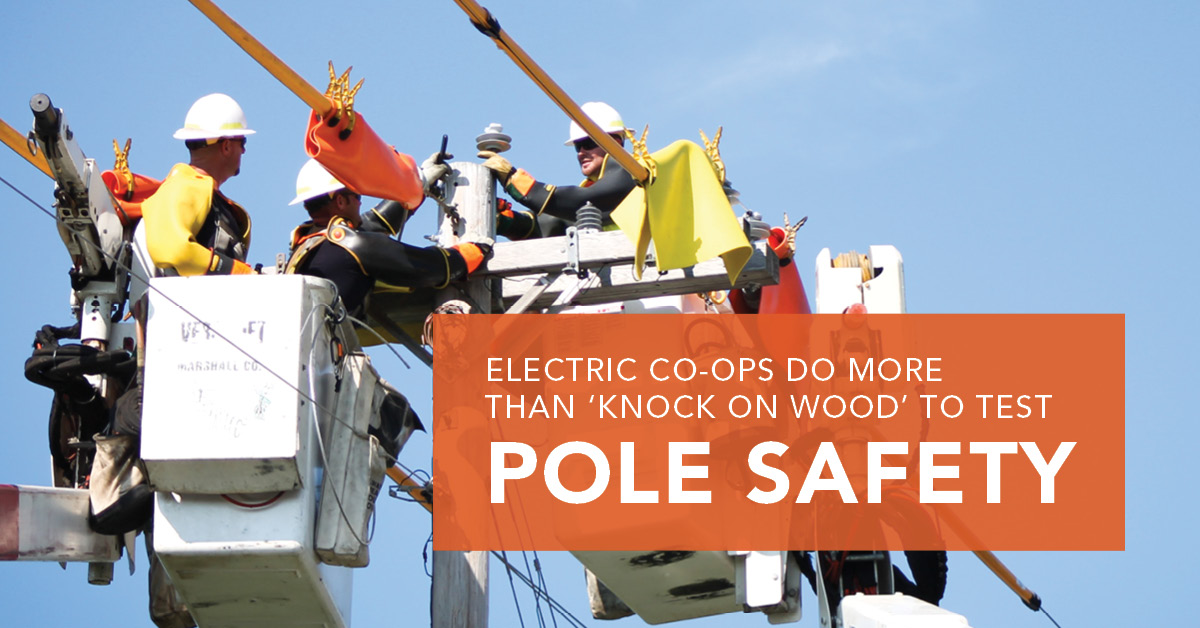Life isn’t about waiting for the storm to pass. It’s about about learning the safety precautions to take once it’s gone.
After a storm, many think the dangers have left with the high winds, heavy rain and lightning strikes; but sometimes danger can come during the storm recovery period. Keeping your distance from downed power lines, and knowing what to do if you see one, are the first steps when recovering from a storm safely.
If you see a downed power line, which could be making contact with tree limbs, vehicles and puddles, always stay clear about 30 feet. There is no way of knowing whether or not the power line is still live, and if you happen to touch one that is, consequences could be deadly.
“Large overhead power lines can carry more than 700,000 volts of electricity,” said Tom VanParis, CEO of Indiana Electric Cooperatives. “Fatalities can occur when someone comes in contact with a live wire of only a couple hundred volts.”
If you see that someone already made contact with a power line, do not try to rescue him/her. You can’t help if you become a victim. Immediatley call 911 for assistance, and then contact your local electric utility to turn off the power.
During the storm recovery process, downed power lines are a threat to the area around them. Here are some helpful safety tips from your electric cooperative to help you stay safe around downed power lines:
- If you see a downed power line, move away from it and anything touching it. Keep a distance of 35 feet, as the ground around downed power lines may be energized.
- Assume ALL downed power lines are live.
- If you see someone in direct or indirect contact with a downed line, DO NOT touch him/her. You could become energized as well. Call 911 for assistance.
- NEVER attempt to move a downed power line or anything else in contact with it using an object such as a broom or stick. Non-conductive materials like wood or cloth can conduct electricity if slightly wet.
- Don’t step in water near downed lines.
- Never drive over a downed power line.
- If your vehicle comes in contact with a downed power line while you’re in the vehicle, stay inside the car. Call 911 or honk your horn to get help, but tell those rendering aid to stay away from the vehicle.
- If you must exit the vehicle for life-threatening reasons — jump out and away from it, making sure to land with your feet together and touching. Then, shuffle away with your feet touching until you reach a safe distance. NEVER attempt to get back into a vehicle that is in contact with a power line.
Indiana Electric Cooperatives stresses the importance of staying safe around electricity and downed power lines after a storm passes through. It could save a life.
Source: Electrical Safety Foundation International
Making a safe escape from downed power lines
If your car comes in contact with a downed power line and you must exit due to fire or another imminent threat:
- Do not touch the vehicle and the ground at the same time with any part of your body or clothing.
- Open the door to your vehicle without touching the metal door frame.
- Jump out of the vehicle with both feet together and so both feet land at the same time.
- Shuffle away so that the toe of one foot shuffles forward along the length of the other foot, ensuring that both feet are in constant contact and always touching the ground.
Tips for how to safely clean up after a storm
- Wear proper safety material: As you are cleaning up, make sure you are wearing proper protection to prevent injury. Work gloves, safety glasses, heavy-duty work shirt with long sleeves, work pants, and steel-toe work boots are a good idea if you are working on clearing large amounts of broken, splintered, or sharp debris.
- Stay away from power lines: Always assume a downed power line is live. Downed power lines pose a particularly dangerous threat in areas where there are lots of people trying to clear fallen trees and branches from roads and lawns. Let the professionals handle this job. It’s not worth the risk. If you see a downed power line that is sparking or on fire, call your local power company immediately.
- Use flashlights, not candles: When checking for damage to a home, never use matches, candles, lighters or kerosene lanterns as a light source. Igniting a flame while near damaged gas lines can cause an explosion.
- Stay away from damaged buildings or structures: If a building has been subjected to rushing flood waters or has been submerged under water, it may not be structurally safe. It’s best to stay away from these types of structures until professionals can assess the extent of the damage.
- Never operate gasoline-powered equipment indoors: Gas engines emit carbon monoxide — an odorless, colorless, and poisonous gas you should never breathe.





